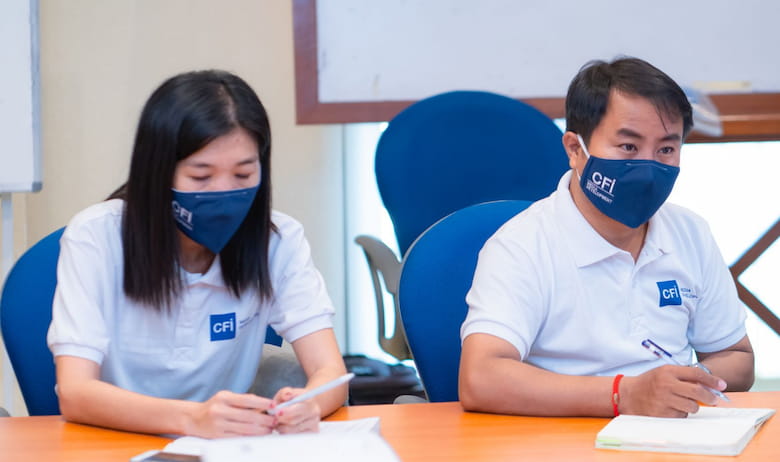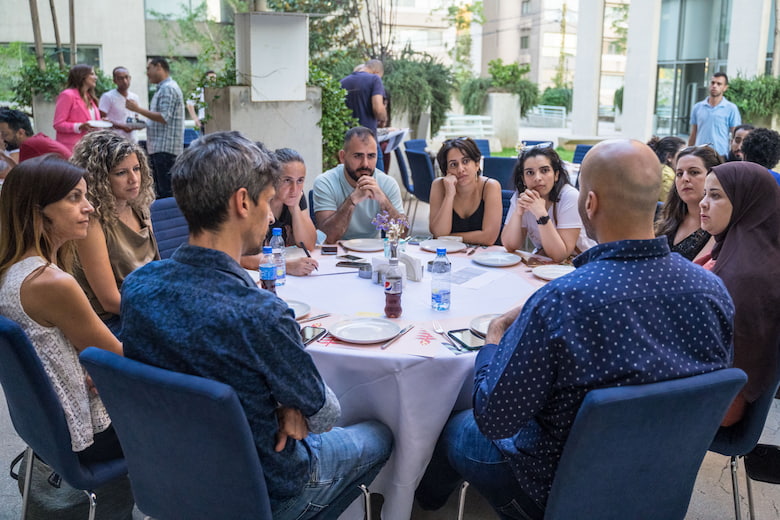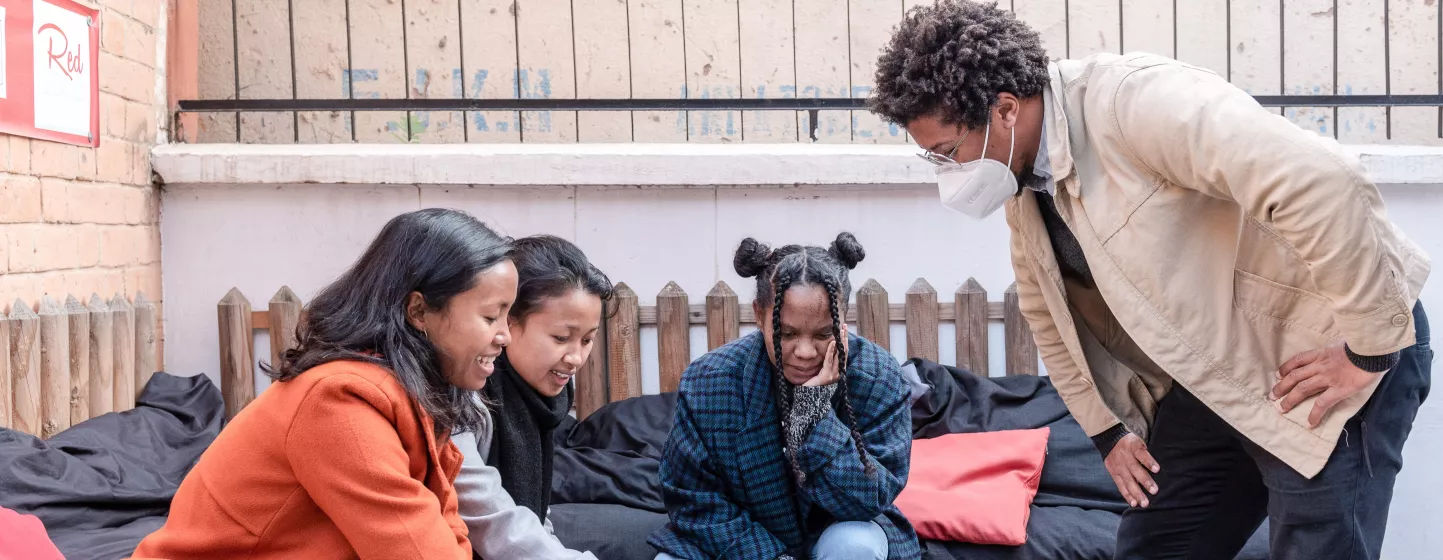Our values
CFI first started working to promote freedom of information, pluralism of the media and reliability of information over thirty years ago. Since then, we have tirelessly defended these values and implemented initiatives all over the world to help promote them.
In the field, we always make sure our initiatives are sustainable. Taking the long view has led to us forging lasting relationships with our local partners. Respect for others, listening and dialogue are all core elements in the day-to-day functioning of the agency. We are also convinced that equality is a powerful tool for social transformation.
We adopted a Statement of Principles on 14 May 2020, formally stating these key values. This document underpins the agency’s commitment to its actions carried out with the whole of its community.
In 2021, we adopted two additional documents: a Diversity and Inclusion Charter and a Language Charter. These operational resources embody our clear commitment to equality, dialogue and respect. Because, for us, values are more than just words. Above all, they are acts.
The Statement of Principles
Preamble
CFI is a media development agency which strives for freedom of expression, media freedom and independence.
It supports media outlets and members of civil society in countries committed to circulating pluralistic information that promotes democracy and equality and also takes account of sustainable development needs.
As it guarantees the right to reliable, independent and verified information, the media are a core element in the democratic balance of societies. They play an active role in upholding values, empowering change and driving progress. Supporting the media is a step towards achieving the United Nations Sustainable Development Goals (SDGs). This places particular responsibility on media development agencies.
As the agency is called upon to intervene in increasingly sensitive and volatile situations, its values need to be reasserted.

This Statement of Principles is therefore intended to serve as a reminder of the fundamental values that guide CFI in its actions with its entire community (institutional stakeholders, partners, beneficiary journalists and experts). It aims to reassert some of CFI's key commitments, and in doing so to strengthen the trust and commitment of its partners and those who receive support through its projects.
Bedrock values
CFI's actions are underpinned by shared values inspired by the principles enshrined in the International Bill of Human Rights (1948 declaration and 1966 pacts), the Munich Charter of Professional Ethics for Journalists (Declaration of the duties and rights of journalists of 1971), all of the declarations associated with the effectiveness of aid (2005 Paris Declaration and 2011 Busan Partnership) and the Sustainable Development Goals adopted in 2015 by all Member States of the United Nations.
These values are expressed in the seven following principles and commitments:
1- Respect
CFI declares its commitment to the principles of respect for human dignity and the absence of discrimination in any form.
In the performance of its missions, CFI works towards promoting a spirit of tolerance and mutual understanding. It does not work with persons or entities that incite hate or violence on the grounds of race, gender, religion, philosophical concepts, sexual orientation or belonging to a minority group.
2- Freedom
CFI asserts its unwavering commitment to freedom of expression and the freedom of the media, as well as to the fundamental freedoms underpin the democratic balance of a society.
Information freedom also implies freedom to pass comment and criticise within the boundaries set by generally accepted ethical and moral rules.
3- Pluralism
CFI supports and defends media pluralism by guaranteeing the diversity of content and opinions.
This especially includes a commitment to supporting media outlets as they switch to digital, helping them to structure their digital services and ensuring their economic viability.
4- Equality
CFI undertakes to contribute to strengthening public debate on key aspects of development and in particular on gender equality and environmental and health issues, from an inclusive standpoint and with respect for cultural diversity.
5- Reliability
CFI supports media outlets that produce and broadcast reliable information of interest to the public.
CFI encourages and promotes the concerted actions of media outlets and civil society organisations that help to develop citizen monitoring, which is considered a key means of improving the transparency and monitoring of public actions.
6- Sustainability
CFI conducts all of its actions with a constant focus on sustainability.
To ensure their effectiveness, solutions developed and implemented jointly must be wholly owned by the beneficiaries and partners.
7- Dialogue
CFI promotes a culture of exchange, dialogue and sharing of good practices between the media community and all of the stakeholders with which it interacts, including regulatory bodies and public authorities.
The Gender equal writing Charter
The promotion of equality is one of the cornerstones of the support provided by CFI, as well as one of its internal priorities.
In 2019, the agency adopted a "gender" strategy that helps to boost gender equality from three perspectives:
-
Internally (working conditions, company agreement, safety while on assignments, prevention of sexual and gender-based violence etc.);
-
Within the scope of its projects (working "with" and "for" women in the media, urging the media to tackle more gender equality issues in a more effective manner etc.);
-
Within its communications.
For the latter, the agency has adopted a Gender equal writing Charter, which applies to all publications, regardless of whether they are intended for staff in-house or the general public.
The decision to communicate using inclusive language is not merely a question of principle and symbolism, it is also an operational necessity.
Read the Gender equal writing Charter (in French) (PDF)
The specific recommendations set out in the Gender equal writing Charter are obviously applicable only to communications produced in French. However, editorial offices using other languages (especially English and Arabic) should still respect the spirit of the charter, refer to it and aim to use inclusive language whenever grammatically possible.
The Language Charter
Defending and promoting multilingualism are among the founding principles of CFI.
We believe that respecting and promoting the diversity of languages helps to boost citizen engagement and democracy. Such diversity also promotes dialogue, tolerance and acceptance of all differences. In the majority of countries in which CFI is active, multilingualism is more than just a value. It is a daily reality for the people we support.

That is why, in 2022, the agency adopted a Language Charter that sets out 12 rules for operating internally, internationally and in the context of its communications.
Now, when communication aids are required in foreign languages, priority is always given to multilingualism. Whenever training or events are organised, an interpreting system is automatically set up if attendees do not speak the same language.
Lastly, when choosing the names of our projects, priority is given to using the national languages spoken by those receiving support. Otherwise, French is used.
